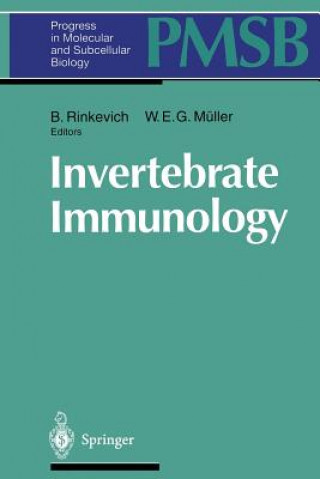
Code: 06973468
Invertebrate Immunology
by W. E. G. Müller, B. Rinkevich
The biological bases of invertebrate immune responses have interested scientists for decades, from the first relevant observation by E. Metchnikoff in 1882, who discovered phagocytosis while studying starfish larvae. Invertebrate ... more
- Language:
 English
English - Binding: Paperback
- Number of pages: 250
Publisher: Springer-Verlag Berlin and Heidelberg GmbH & Co. KG, 2011
- More about this

121.04 €

Low in stock at our supplier
Shipping in 13 - 16 days
Potřebujete více kusů?Máte-li zájem o více kusů, prověřte, prosím, nejprve dostupnost titulu na naši zákaznické podpoře.
Add to wishlist
You might also like
-

If You Were Raised by a Dinosaur
11.59 € -4 %
Give this book as a present today
- Order book and choose Gift Order.
- We will send you book gift voucher at once. You can give it out to anyone.
- Book will be send to donee, nothing more to care about.
More about Invertebrate Immunology
You get 304 loyalty points
 Book synopsis
Book synopsis
The biological bases of invertebrate immune responses have interested scientists for decades, from the first relevant observation by E. Metchnikoff in 1882, who discovered phagocytosis while studying starfish larvae. Invertebrate immunology first began to be appre ciated as an important field in the late 1960s and 1970s. However, in the following years there was much controversy regarding the question: do invertebrates offer insight into the origin of the sophisticated immune responses of the vertebrates? There are several reasons why progress in research on invertebrate immune competence has been painfully slow. One of the main impediments to the progress, as compared to the fast development of knowledge in the vertebrate systems, was the fact that most of the studies concentrated on "whole organism" assays, mainly on grafting tissues between allogeneic partners. Only in the last few years have more and more aspects of invertebrate immunity been investigated on the cellular, biochemical and molecular levels. These studies led to discoveries of novel defense reactions, new pathways of effector mechanisms which are elicited after recognition of "nonself', and complex, sometimes highly polymorphic genetic elements that control invertebrate immune reactions. The importance of invertebrate immunity for understanding "immunology" as a whole, despite the conflicting models and hypotheses, is now much more recognized than before. Although most of the 20 phyla belonging to the inver tebrates have different modes of life, body organizations, habitats occupied, and biochemical patterns, they show striking aspects of exceptional precision for discriminating between self and nonself.
 Book details
Book details
Book category Books in English Medicine Clinical & internal medicine Diseases & disorders
121.04 €
- Full title: Invertebrate Immunology
- Author: W. E. G. Müller, B. Rinkevich
- Language:
 English
English - Binding: Paperback
- Number of pages: 250
- EAN: 9783642797378
- ISBN: 3642797377
- ID: 06973468
- Publisher: Springer-Verlag Berlin and Heidelberg GmbH & Co. KG
- Weight: 411 g
- Dimensions: 235 × 155 × 15 mm
- Date of publishing: 27. December 2011
Trending among others
-

Emperor of All Maladies
12.50 € -20 % -

Radical Remission
18.05 € -10 % -

Healing Add
17.85 € -15 % -

Psychosomatic Medicine
20.77 € -16 % -

Cancer Is Not a Disease - It's a Healing Mechanism
28.13 € -

How to Starve Cancer
19.26 € -28 % -

Kuby Immunology
89.87 € -

Healing Lyme Disease Coinfections
17.04 € -18 % -

TNM Classification of Malignant Tumours 8e
52.35 € -1 % -

Autoimmune Solution
12.80 € -18 % -

Oxford Handbook of Infectious Diseases and Microbiology
45.08 € -11 % -

Spillover
15.32 € -

Cancer and the New Biology of Water
20.87 € -19 % -

Guide for Delineation of Lymph Nodal Clinical Target Volume in Radiation Therapy
106.41 € -4 % -

Myasthenia Gravis and Related Disorders
127.60 € -4 % -

Target Volume Delineation for Conformal and Intensity-Modulated Radiation Therapy
178.74 € -

An Epidemic of Absence
16.63 € -20 % -

Oxford Desk Reference: Toxicology
136.88 € -

Bethesda Handbook of Clinical Oncology
77.97 € -9 % -

Cancer as a Metabolic Disease - On the Origin, Management, and Prevention of Cancer
160.49 € -

Breast Ultrasound
95.82 € -4 % -

CT Anatomy for Radiotherapy
90.78 € -

LYMPH & LONGEVITY
19.66 € -18 % -

Natural Treatments for Lyme Coinfections
16.94 € -18 % -

Everyday Mindfulness for OCD
13.81 € -23 % -

Oxford Handbook of Clinical Immunology and Allergy
45.08 € -

Manual of Clinical Oncology
68.49 € -7 % -

Infectious Diseases: A Clinical Short Course
112.06 € -

Musculoskeletal Imaging
90.38 € -

Graphic Guide to Infectious Disease
39.43 € -12 % -

Emergency Management of Infectious Diseases
126.09 € -14 % -

Complete Guide to Breast Cancer
19.66 € -18 % -

Atlas of Contrast-enhanced Sonography of Focal Liver Lesions
106.41 € -4 % -

Pocket Radiation Oncology
50.23 € -10 % -

Illustrated Anatomical Segmentectomy for Lung Cancer
169.87 € -4 % -

Palliative Radiation Oncology
195.29 € -9 % -

Breast Imaging Companion
136.78 € -

Atlas of Head and Neck Cancer Surgery
127.60 € -4 % -

Oncology: Genomics, Precision Medicine and Therapeutic Targets
175.31 € -

Immunology Guidebook
254.40 € -

Stay Healthy During Chemo
15.32 € -23 % -

Genetics and Epigenetics of Breast Cancer
175.31 € -

Schaum's Outline of Immunology
27.02 € -14 % -

Gout & Its Cure
4.93 € -18 % -

Great Influenza
17.74 € -11 % -

Oxford Handbook of Expedition and Wilderness Medicine
60.01 € -

Basic Immunology
63.84 € -12 % -

p53
14.52 € -15 % -

Lanzkowsky's Manual of Pediatric Hematology and Oncology
208.20 € -5 %
Collection points Bratislava a 2642 dalších
Copyright ©2008-24 najlacnejsie-knihy.sk All rights reservedPrivacyCookies


 15549 collection points
15549 collection points Delivery 2.99 €
Delivery 2.99 € 02/210 210 99 (8-15.30h)
02/210 210 99 (8-15.30h)